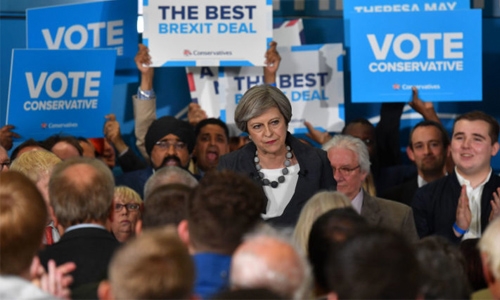British PM loses majority, faces pressure to resign
London : British Prime Minister Theresa May faced pressure to resign on Friday after losing her parliamentary majority, plunging the country into uncertainty as Brexit talks loom.
The pound fell sharply amid fears the Conservative leader will be unable to form a government and could even be forced out of office after a troubled campaign overshadowed by two terror attacks.
After being re-elected with an increased majority in the London commuter seat of Maidenhead, May said Britain "needs a period of stability" as it prepares for the complicated process of withdrawing from the European Union.
She said that while the full results had yet to emerge, her party seemed to have won the most seats and "it would be incumbent on us to ensure we have that period of stability".
But Leftist opposition leader Jeremy Corbyn, whose Labour party surged from 20 points behind, urged May to quit, saying she had "lost votes, lost support and lost confidence".
Former Conservative minister Anna Soubry, who just held onto her seat, said May was "in a very difficult place" following a "dreadful campaign".
With a handful of seats still to be declared, the Conservatives were predicted to win 319 seats, down from 331 in 2015 -- yet another upset in a turbulent year since the EU referendum in June 2016.
They were mathematically unable to reach the 326 mark that would give them a majority, meaning they will have to form an informal or formal alliance to forward their agenda.
Labour are expected to increase their share from 229 to 260 seats, resulting in a hung parliament.
May, a 60-year-old vicar's daughter, is now facing questions over her judgement in calling the election three years early and risking her party's slim but stable majority of 17.
"It is exactly the opposite of why she held the election and she then has to go and negotiate Brexit in that weakened position," said Professor Tony Travers of the London School of Economics.
Sterling fell nearly two percent against the dollar on the back of the exit poll, as investors questioned who was now going to control the Brexit process.
Early newspaper editions reflected the drama, with headlines such as "Britain on a knife edge", "Mayhem" and "Hanging by a thread".
In a night that threatened to redraw the political landscape once again, the UK Independence Party (UKIP), which won 12.5 percent of the vote two years ago and was a driving force behind the Brexit vote, was all but wiped out, hovering around two percent.
The pro-European Liberal Democrats, who have campaigned for a second EU referendum, increased their number of seats from nine, but their former leader Nick Clegg lost his seat.
Meanwhile the Scottish National Party of First Minister Nicola Sturgeon, which has dominated politics north of the border for a decade and called for a new independence vote after Brexit, was tipped to lose around 21 of its 54 seats.
Deputy leader Angus Robertson, one of the strongest SNP performers in the House of Commons, was an early casualty.
Related Posts

